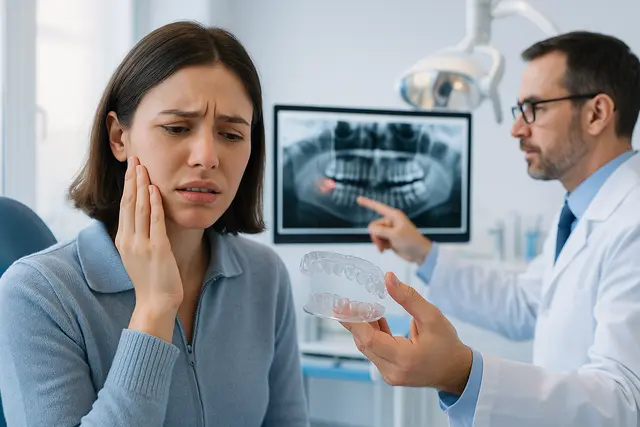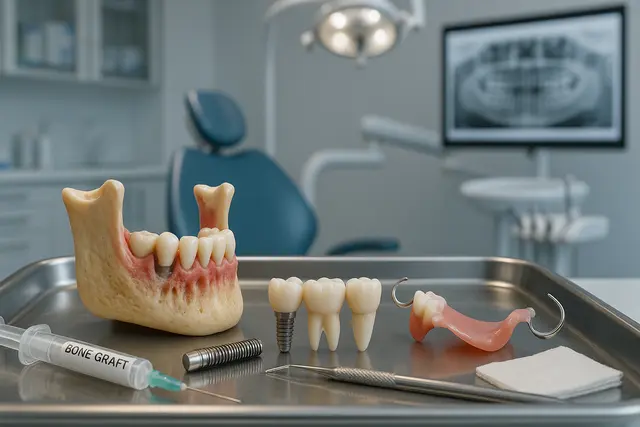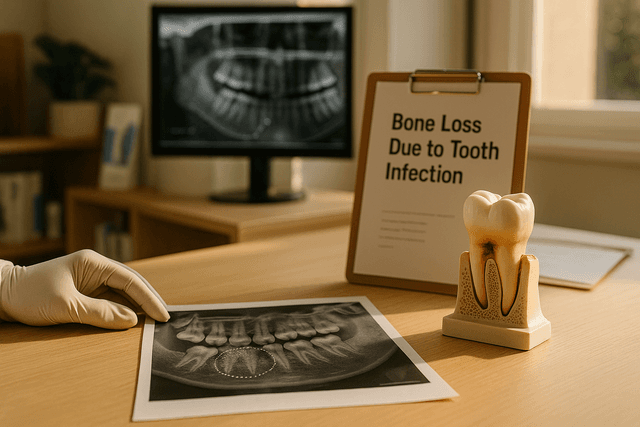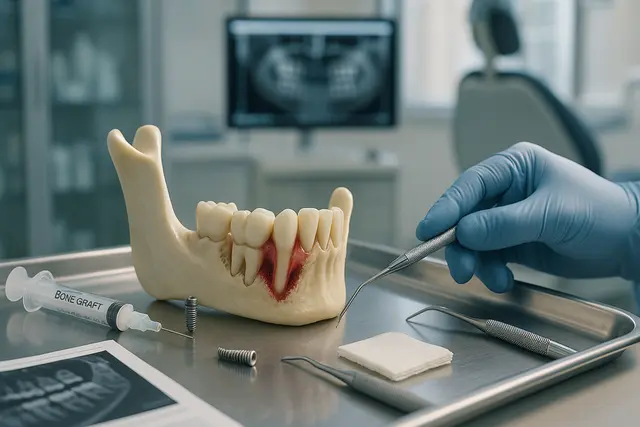Oral Health
5 min read
Jul 09, 2025
Wisdom Teeth Causing Ear Pain: What You Need to Know
Ever get a mysterious earache that shows up out of nowhere, no cold, no infection, just that deep, nagging throb? Believe it or not, your wisdom teeth might be to blame. These late-blooming molars can stir up trouble far beyond your mouth, especially when they grow in wrong or get stuck.

Wisdom Tooth 101: Why The Last Permanent Teeth Stir Trouble
Picture this: you’re halfway through your morning coffee when a dull ache blossoms near your ear. Your first thought might be an ear infection, but the real troublemaker could be a wisdom tooth. These late-blooming molars, often called the last permanent teeth, squeeze into an already crowded jaw, and that tight fit can spark all kinds of pain and irritation.
Because wisdom teeth are located so close to the ear canal and share nerve pathways with the jaw and ear, pain that radiates from an impacted wisdom tooth often masquerades as an earache. Teeth usually erupt without drama, but when space is scarce, a wisdom tooth can spread pressure to nearby teeth, irritate the jaw joint, and send zinging signals right up to the ear.
Impacted Wisdom Teeth And The Earache Nobody Warned You About
An impacted wisdom tooth is one that gets stuck or impacted beneath the gum or crashes sideways into surrounding teeth. Impacted wisdom teeth may tilt, twist, or refuse to rise at all. That awkward position strains the jaw and ear, creating referred pain, the brain’s confused way of routing sensations from one place to another.
Impacted wisdom teeth can cause recurring ear pain because the inflammation doesn’t stay local; it creeps along shared nerves and soft tissue. If you’re experiencing ear pain that flares whenever you chew or yawn, or pain due to the close quarters at the back of your mouth, blame those impacted wisdom teeth. Left untreated until the teeth are extracted, they can provoke:
Headaches
Jaw pain
A sore throat that feels oddly one-sided
Infected Wisdom Teeth: Pain That Radiates Beyond The Jaw
Sometimes the trouble escalates. Food and bacteria slip under the gum flap, and infected wisdom teeth start brewing. A wisdom tooth infection can spread quickly, causing swelling, tooth decay, and pain caused by wisdom teeth that radiates to your ear. Ear pain caused by wisdom roots often pairs with a funky taste you can’t rinse away. Because wisdom teeth grow in an area that’s hard to reach with a toothbrush, brushing your teeth may not dislodge the debris. The result?
Pain and inflammation
Bad breath
A sore throat caused by the tooth that refuses to play nice
Over-the-counter pain relievers offer short-term relief, but they can’t cure infection. Impacted wisdom teeth untreated raises the risk of abscesses that could move beyond teeth and jaw.
Common Symptoms Of Impacted Wisdom Teeth You Might Miss
Not sure whether your discomfort is related to your wisdom teeth? Watch for these signs and symptoms:
Swelling at the gum line
Pain that radiates to the nearby teeth
Earache that appears without a cold
Jaw stiffness
Irritation both at the tooth and down the neck
These common symptoms of impacted wisdom teeth often arrive in clusters. Perhaps you notice tooth pain after crunchy snacks, then a dull throb behind the ear, followed by ear pain and sore throats that linger. Because teeth can cause recurring ear aches, people sometimes visit an ENT first. A quick panoramic X-ray can diagnose the cause, helping you and your dentist decide whether wisdom tooth extraction is the smartest move.
When Wisdom Teeth Cause Ear Pain And Sore Throat
Wisdom teeth can also fire off pain signals farther south. Inflammation at the back of the mouth can cause a sore throat, or even cause ear pain due to swelling that presses against nerve endings. You’re experiencing ear pain on Monday, a scratchy throat on Tuesday, and by the weekend you wonder if a mystery virus has taken up residence.
The truth is simpler: wisdom teeth cause ear pain and they cause a sore throat too. Because the tissues of the jaw and throat sit so close, irritation travels quickly. Pain caused can feel like strep one day and a sinus headache the next. Paying attention to patterns, such as pain that spikes while chewing, helps determine if your wisdom teeth are the real culprits.
Remove Wisdom Teeth: Treatment Options For Impacted Wisdom
Once your dental team spots signs of an impacted wisdom tooth, they’ll outline treatment options. If the tooth is not removed quickly, infection and swelling may spread. Wisdom teeth removal is often smoother than clients expect; local anesthesia, a calm playlist, and a few gentle stitches can remove wisdom teeth before they wreak more havoc.
Your surgeon may recommend extracting one or all, depending on how many teeth cause no pain now but show early trouble on X-ray. Remember, impacted or infected wisdom teeth rarely improve with time. Wisdom teeth consultation isn’t just paperwork; it’s the best way to preserve the health of your wisdom teeth, or decide when those teeth are extracted.
Dental Checkpoint: How Your Dentist Can Relieve Ear And Jaw Pain
A seasoned dentist looks beyond obvious cavities. They know wisdom teeth can cause ear-tugging misery and jaw stiffness. During an exam, they’ll check signs of an impacted wisdom tooth, watch for tooth decay at the back molars, and press gently to see if pain radiates. They may note that impacted wisdom teeth can cause pressure on surrounding teeth or catch early cracks.
If the pain and irritation reach a point where you can’t sleep, your dentist may prescribe antibiotics, suggest warm saltwater rinses to relieve ear and throat tension, and schedule surgery. They’ll also explain how over-the-counter pain relievers help until the surgical date and how to keep swelling down afterward. Good dental care isn’t just about drills; it’s about diagnosing the cause of your discomfort and charting a realistic plan.
Wisdom Teeth Consultation: Next Steps To Protect Surrounding Teeth
Still not sure? A wisdom teeth consultation provides clear answers. Digital images reveal whether wisdom teeth are impacted, tipped toward nearby teeth, or creeping toward nerves. You’ll learn options for impacted wisdom teeth, hear how leaving an impacted tooth untreated can cause infection, and discover how wisdom teeth can cause recurring flare-ups.
The goal is to determine if your wisdom teeth pose a risk to the surrounding teeth or if they can stay put. If surgery is best, you’ll receive simple prep instructions, no science lecture, just practical tips. After removal, most patients notice that pain caused by wisdom teeth disappears almost overnight, earaches fade, and the jaw loosens up.
From Mystery Pain to Real Relief
Referred pain is tricky, but it isn’t magic. When the jaw and ear share nerves, a wisdom tooth occurs out of sight yet loud enough to hijack your day. If earache and jaw twinges keep visiting, or if teeth and jaw feel tight whenever you chew, don’t wait for pain to spiral.
Diagnose the cause: call your dentist, schedule imaging, and let a professional help. Whether you need simple monitoring or full wisdom tooth extraction, swift action protects the health of your wisdom teeth, your nearby teeth, and yes, your precious, overworked ears.
Can Wisdom Teeth Cause Ear Pain and Sore Throats?
Yes, impacted or infected wisdom teeth can cause referred pain that radiates to the ears and throat. Because the jaw, ears, and throat share nerve pathways, inflammation from a troubled wisdom tooth often mimics an earache or sore throat, especially during chewing or yawning.
What Are Common Signs of an Impacted Wisdom Tooth?
Signs of an impacted wisdom tooth include gum swelling, jaw stiffness, pain behind the ear, difficulty chewing, and soreness that may feel like a one-sided sore throat. These symptoms often appear in clusters and may be mistaken for sinus or ear infections.
How Are Impacted or Infected Wisdom Teeth Treated?
Treatment typically involves a dental exam, imaging (like a panoramic X-ray), and wisdom tooth removal. Dentists may prescribe antibiotics for infection and recommend saltwater rinses or pain relievers. Extraction is often necessary to prevent ongoing pain, infections, or damage to nearby teeth.
Why Should I Get a Wisdom Teeth Consultation?
A wisdom teeth consultation helps determine if your teeth are impacted or likely to cause future problems. Early detection allows for easier removal and prevents complications like chronic jaw pain, earaches, infections, or shifting nearby teeth. Digital imaging offers a clear view of your risk.
Read Next
Related Posts

Oral Health
Tooth Replacement Options to Prevent Bone Loss
Losing a tooth isn’t just about appearance, it can have a lasting impact on your oral health, jawbone strength, and overall quality of life. When teeth go missing, the jawbone begins to shrink, which can change your bite, your facial structure, and even your confidence. Fortunately, modern dentistry offers several effective solutions to replace missing teeth and prevent further bone loss.
4 min read
Sep 26, 2025

Oral Health
Bone Loss Due to Tooth Infection Explained: What It Means for Your Oral Health
A tooth infection isn’t just about pain, it can quietly damage the tissues around a tooth and even erode the jawbone that supports your smile. This guide explains how infections start, why they can lead to bone loss, the warning signs to watch for, and the treatments that can stop the spread and rebuild lost support.
5 min read
Sep 25, 2025

Oral Health
Understanding Bone Loss in Teeth: Causes and Treatments That Work
Bone loss in teeth is a silent threat that can compromise your smile, facial structure, and overall oral health. While it often goes unnoticed in the early stages, it can lead to serious consequences if left untreated. Understanding what causes dental bone loss, and how to prevent or manage it, is key to maintaining a strong, healthy foundation for your teeth.
5 min read
Sep 25, 2025
Don’t have time to research every dentist around you?
See why 30k+ patients trusted us